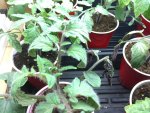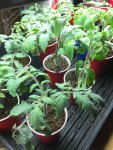I can't begin to express how frustrated I am with tomatoes.... this is the 4th year I've run into issues, every year they either get blight or wilt and die, I've rotated them to three different beds who have never seen a nightshade and they still died. Last year my sunflowers even got the wilt and died right when they got their first blooms.
This year they've really stepped it up though, my indoor starts now have what I believe is verticillium wilt. Yes.... my INDOOR starts.... all I can figure is that the tray they're in had an overwintered bell pepper plant in it and some of the fungus transferred from the bottom of that container to my tomato plants, I did not wash out the tray. Time to start some new seeds I guess and wash out the tray properly this time. With that said.... how do people deal with these fungus's? It's clearly in all my beds somehow, I know commercial growers have to deal with this stuff and they do something to cure their fields. Any suggestions? I'm about to just container grow them and keep them as far away from my beds as possible...
This year they've really stepped it up though, my indoor starts now have what I believe is verticillium wilt. Yes.... my INDOOR starts.... all I can figure is that the tray they're in had an overwintered bell pepper plant in it and some of the fungus transferred from the bottom of that container to my tomato plants, I did not wash out the tray. Time to start some new seeds I guess and wash out the tray properly this time. With that said.... how do people deal with these fungus's? It's clearly in all my beds somehow, I know commercial growers have to deal with this stuff and they do something to cure their fields. Any suggestions? I'm about to just container grow them and keep them as far away from my beds as possible...



